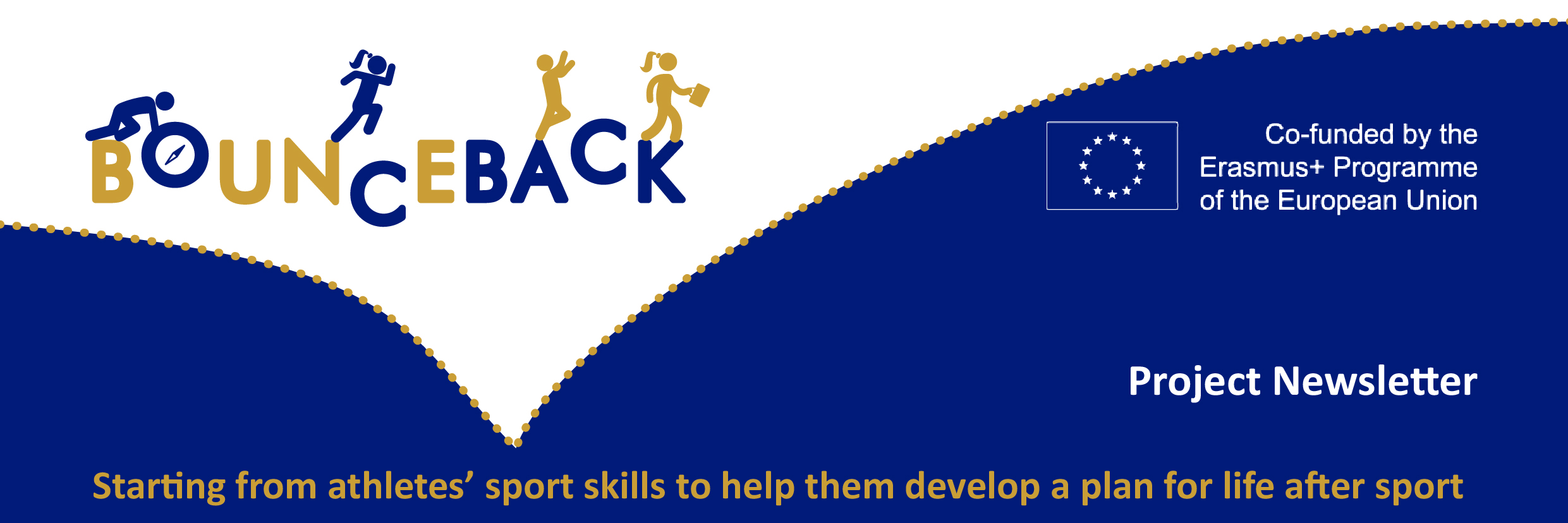Newsletter Issue #8 – September 2022
Bounceback events: strengthening outreach towards a phase 2 of the project
Much has happened since the first issue of the Bounceback project newsletter. The team has achieved great results and is ready to successfully formally close the project by end October 2022. Why Formally? Because all partners seem to agree that this was only a great start, and are ready to engage in future work and commitments to ensure that the great outputs produced in these 18 months end up serving a vast number of athletes both in the EU and beyond.
Thanks to the multiplier events and major conference held in the last few weeks, we are in a position to confirm that yes we will move ahead and the appetite is vast.
This issue of the newsletter aims at summarising the partnership and out reach actions taken by the local team through the multiplier events and major conference organised.
COUNTRY SPECIFIC REPORTING
The case of Greece: AEK and Militos
Two multiplier events were held in Greece: one by AEK, one by Militos.
AEK Athletic Club organized a 1-day demonstration workshop about its actions for the year that passed, inviting athletes, officials from the federations they cooperate, sponsors, businessmen and potential cooperators in Athens, on 10 th July 2022. Aims were to a) facilitate the dissemination of project outputs to target groups, b) provide a space for the evaluation and validation of project results, and c) engage stakeholders and target groups in providing information for the policy recommendations report, using data collection tools prepared by UP. AEK gathered the results of data collection questionnaire and sent them to UP. The lead partner provided organizational guidelines for the workshops. The event took place at the Museum of Minor Asia Civilization “Filio Haidemenou” which is connected with the history and the values that the club represents. During the multiplier event, AEK presented the results of the Bounceback project. The goal and the actions of the program were explained in European level and then AEK’s Bounceback actions were presented, like
the BOUNCEBACK match-making tool; learning materials and platform and pilot training sessions’ results, the athletes’ interviews, the TPM in Rome etc. The participants found Bounceback program interesting and useful because they all recognize the need of veteran athletes to succeed in something different and find their new path.
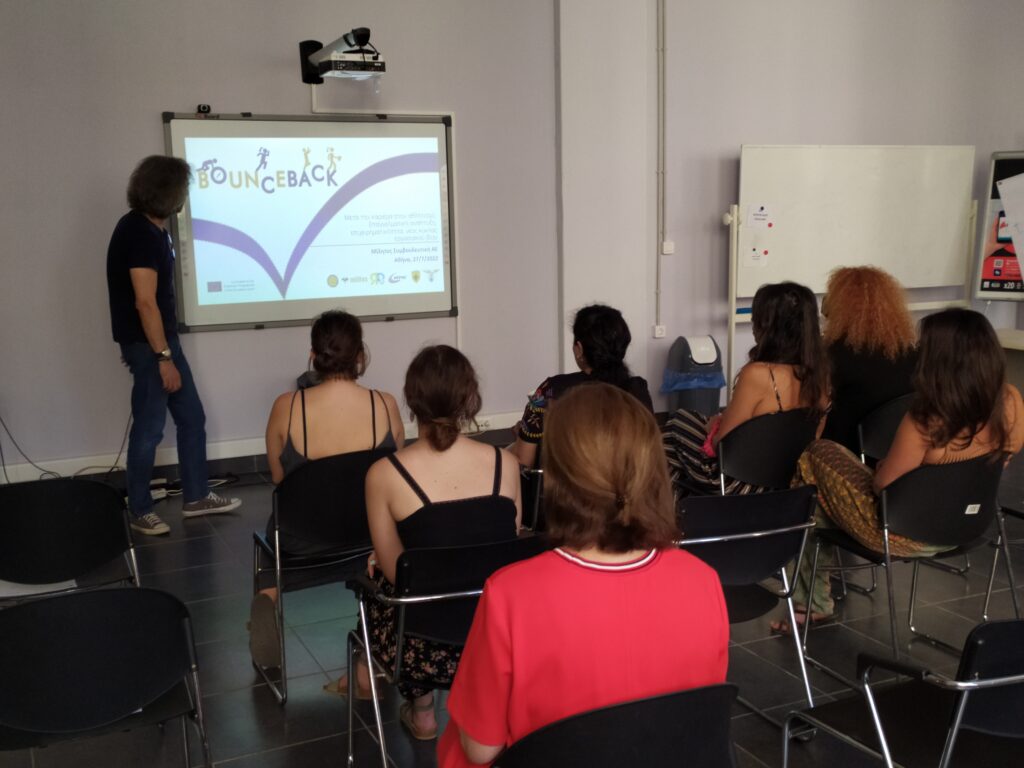
The event organized by Militos Consulting SA had a two-fold objective: from the one hand to present the professional development challenges of persons in a sector which is detached from the labour market opportunities after retirement (sports sector) an, from the other, highlight the transferable character of soft skills.
To this end, a set of two slots have been prepared to involve the audience. First, the challenges for veteran athletes at the professional level after their sports career were highlighted, showcasing the objectives, findings, and experiences of Bounceback project, and in particular how the project partners documented gaps and methodologies to close the professional development gaps through the provision of professional development training, drawing from the pool of skills and competences of athletes to be transferred into professional skills and competences (either at the level of employment. Or entrepreneurship).
The transversal character of soft skills were presented by an adult trainer on behalf of Militos (Ms. Marianna Terzidaki), while the training approach of Bounceback (online platform) has been presented by Mr. Kyriakos Lingas (Militos).
The mix of the participants are idividuals active in professional development and entrepreneurial support. A follow up discussion was carried out with respect to both the sector-specific aspect of the project and the intervention, as well as the transferability potential of soft skills.
The main points of interest as stressed by the participants were the following:
- Acknowledging the need to structure training interventions by drawing from past experiences (adult education principle, engaging learners)
- Prompting learning experiences that have low instructional nature and high interaction/active involvement nature on behalf of learners, especially athletes who have been detached from formal and non-formal education during their career. Exploring the transferability potential of the Bounceback training to be applied in contexts other than that of the sports sector, sharing however similar characteristics with the sport sector (e.g., former military personnel etc.)
The participation of an educational association as well as AKEP (Academy of entrepreneurship) was valuable, since possible synergies in VET and entrepreneurial development areas at local level have been established, mostly with respect to the methodological approach of the Bounceback training provision, the training and learning methods and tools, the concept of the Match-making tool.
The case of Italy
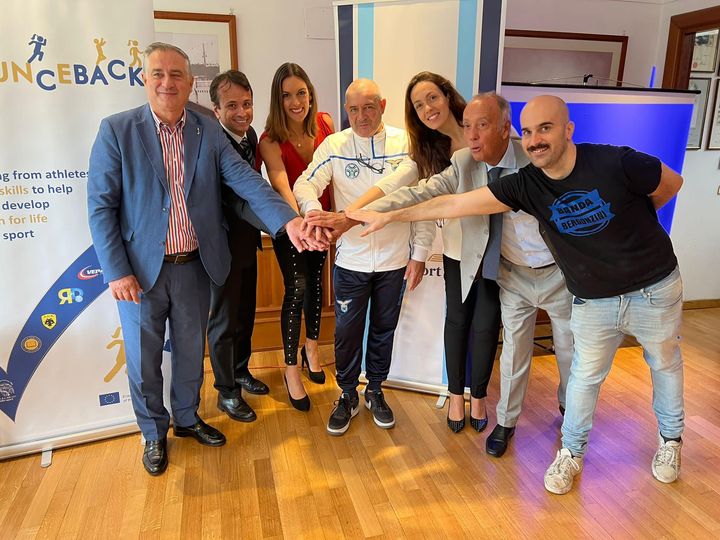
The multiplier event held on 30 September 2022 at the historical and representative venue of Circolo Canottieri Lazio was a great confirmation of the commitment and enthusiasm of for the multisport club Lazio vis a vis the Bounceback project.
Lazio Karate (Bounceback project implementing partners) is in fact a member of one of the biggest multisport clubs in Europe, and the event offered an opportunity to invite representatives of other associations members of the multisport club Lazio as well as federations, and private sector and academia representatives, to showcase and discuss about the project’s core outputs, i.e. the match making tool and learning platform.
The event had two presenters: Ms. Maria Luisa Saponaro, a development programme management expert who contributed to the implementation of Bounceback for Lazio, presented the project, the challenges and opportunities of dual careers in general, and the framework in which the project fits. Mr. Fabrizio Cupellini, whom we have introduced to you in the past issue of the Newsletter, went through the instruments produced by the project in detail for the audience to get a clear idea of the purpose of the platform.
Both the project principles and its core outputs were considered extremely helpful by the entire room, where plenty of bilateral requests for follow up were received.
During the event alone Lazio had also the chance to engage over 15 partners, who are ready and willing to play a role in the dissemination and use of the platform. Their decision makers are willing and supportive of publicising the existence of this tool, to promote dual careers both in Italy and beyond, through EMCA.
The case of Hungary: workshop and major conference
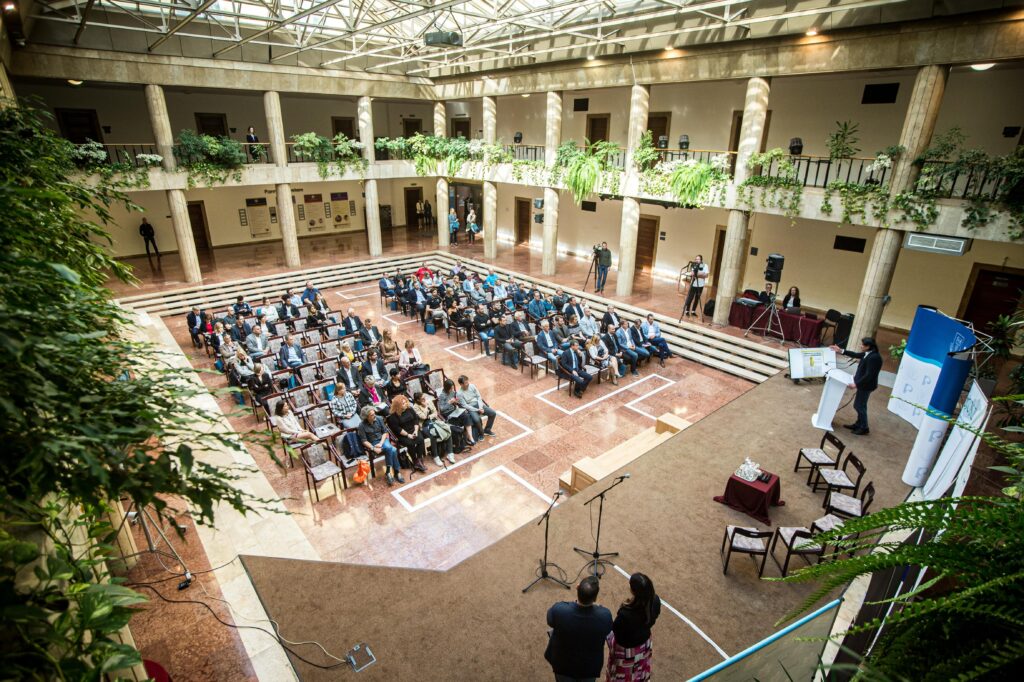
VEDAC in cooperation with UP organized a 1-day demonstration workshop in the University Library in Veszprém on 9th June, 2022. Aims were to a) facilitate the dissemination of project outputs to target groups, b) provide a space for the evaluation and validation of project results, and c) engage stakeholders and target groups in providing information for the policy recommendations report, using data collection tools prepared by UP. Réka Vámosi, project manager and Dr. Edit Kővári, trainer presented the progress of the Bounceback international project (BOUNCEBACK match-making tool (O1), learning materials and platform (O2), and pilot training sessions results (O3)), followed by a round table discussion where Attila Németh, managing director of VEDAC and Krisztián Török, professional director, and Sándor Pató, founding owner of Silverforg Informatika Kft. shared their experiences and opinions. It was announced that the developed online learning material will be made available free of charge, and the project will end with a major conference in September 2022. The workshop was concluded by a forum for sports clubs, where József Nagy, Director of Organisational Development and Training of the National Federation of Sports Clubs, said that the membership of the SOSZ exceeded 750 sports organisations this year, thanks in part to the fact that it has been able to provide HUF 1250 million in direct support to small and medium-sized clubs over the past 6 years under the Believe in You Programme. The SOSZ liked the Bounceback project and expressed its willingness to cooperate. Target group members were asked to fill in a questionnaire, including questions on data collection for policy recommendations. At the end of the conference, the athletes, coaches, decision-makers and representatives of sports organisations present had the opportunity to exchange views and initiate future cooperation in an informal discussion.
The major Bounceback conference entitled ‘Active and veteran athletes in the entrepreneurial and business world’ was held on 19 and 20 September 2022 at the University of Pannonia, in Veszprém. Aims were to a) facilitate the dissemination of project outputs to target groups, b) engage major stakeholders at a national and EU level to promote and advance the utilisation of project results, and c) engage stakeholders and target groups to provide policy suggestions based on the policy recommendations report (O4).
As part of a two-day series of events, a conference presenting the results of a two-year Erasmus+ strategic partnership project took place on Monday 19 September in Veszprém. The Faculty of Business and Economics of the University of Pannonia and the University and Student Athletics Club of Veszprém (VEDAC), in cooperation with the National Federation of Sports Associations (SOSZ), organised the first BOUNCEBACK Conference – Active and veteran athletes in the entrepreneurial and business world in Building B of the University of Pannonia. Project Partners (LAZIO, RNDO, MILIOTS, AEK) also participated in the event. UP provided interpretation in English for foreign participants.
Dr. András Gelencsér, rector of the University of Pannonia welcomed the participants. In his welcome speech he underlined that the Bounceback Project was preceded by a huge preparatory work, which is truly unique. It is important for the University of Pannonia to provide development opportunities not only for young people but also for adults, especially for sportsmen and sportswomen, who can be guided by this initiative to become useful members of society after their careers.
Dr. Tamás Deutsch, president of the National Federation of Sports Associations, said in his speech that the sporting life in Hungary has developed a lot in the last decade, and we should be proud of Bounceback project. This opportunity can lead retired athletes to the job market, where they need the very qualities they learned on the sports field. These include perseverance, team spirit and working as part of a team.
Attila Németh, executive director of VEDAC, praised the cooperation with the partners involved in the project and the activities of the SOSZ. Dr. Júlia Tobak, the professional leader of the project, and Réka Vámosi, the project manager presented the results of the Bounceback project, including an innovative training material aimed at facilitating the integration of veteran/retired athletes, elite athletes and para-athletes into employment and business life after their sports careers, and helping them to succeed in the entrepreneurial sphere. It was also stressed that without the great teamwork the programme could not have been so successful, and they would like to promote it in future through model lessons.
Two more programs took place at the event: the Veszprém University Sports Club (VESC) invited the key rural sports clubs to consult on the tasks of the near future under the leadership of Dr. Tamás Deutsch, and participants were given an insight into the training material of the Bounceback project thanks to trainers dr. Edit Kővári and Tamás Kigyós.
The final event was a round table discussion with famous veteran athletes, para-athlete and experts: Gábor Császár, Dr. Balázs Baji, Dr. Judit Farkas, Zsófia Éva Lengyel and Attila Mizsér. The participants discussed how they could use the experience they gained on the sports field in their business life and how they could combine sport with learning.
The event was a good opportunity to invite the stakeholders to sign a Memorandum of Cooperation for the advancement of the utilization of project outputs and the BOUNCEBACK training approach in general.
On Tuesday 20 September, the event continued with Sports Day and Bounceback Activity programme on the university’s upper campus, where visitors could try out a variety of sports and take part in Bounceback quizzes.
The Bounceback conference ended on Tuesday evening in Papírkutya restaurant, in Veszprém, where three top athletes Fanni Kövér, Hungarian U20 top-ranked, world championship 5th javelin thrower, Kristóf Rasovszky, world champion, Olympic silver medallist long distance swimmer, member of the Sport and Learning Programme of the University of Pannonia and Regina Sipos, K-1 junior European champion martial artist talked about their plans for their sporting and civil life. The discussion was moderated by Dr. Edit Kővári.
Those coaches who attended the conference, 5 training credits was awarded by the Hungarian Coaches Association based on the certificate of attendance received on the venue.
Invited target groups (more than 150 participants) were a) those received training through project outputs and results, i.e. veteran and active athletes, b) those provided training via BOUNCEBACK outputs, i.e. entrepreneurial coaches & relevant VET providers, c, sport clubs, d, the business/entrepreneurial world, and e, policy makers.
https://www.gtk.uni-pannon.hu/bounceback-konferencia/
WHATCH OUR VIDEOS
NEXT STEPS
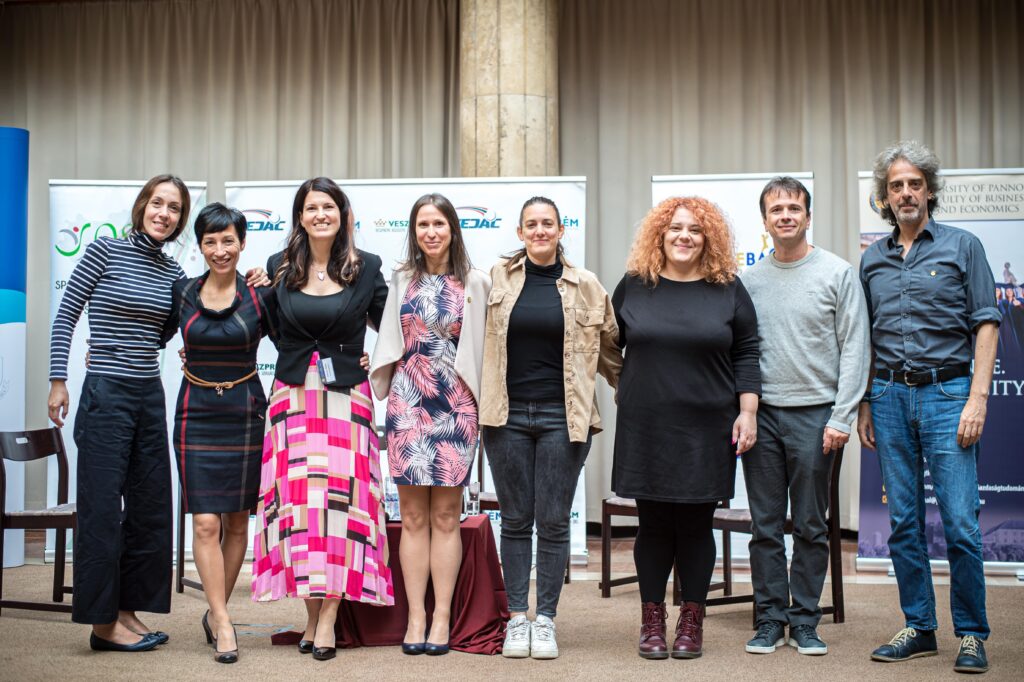
This is the last edition of this newsletter. We hope to be back soon for a new phase of this exciting EU project, possibly involving more partner countries and expertise. Thank you for following us and wish you all a great success in your bounceback journey!
Bounceback Athletes
Developing an innovative learning approach to facilitate the integration of veteran/retired athletes into employment, business and entrepreneurship
www.bouncebackathletes.eu


